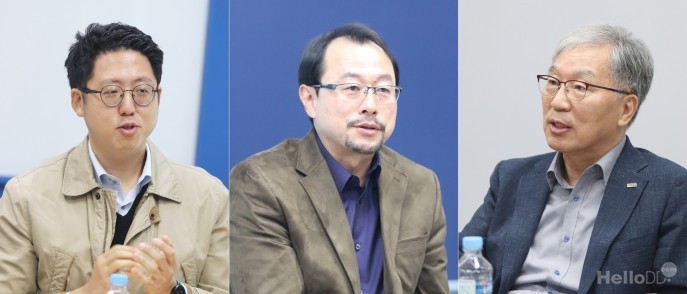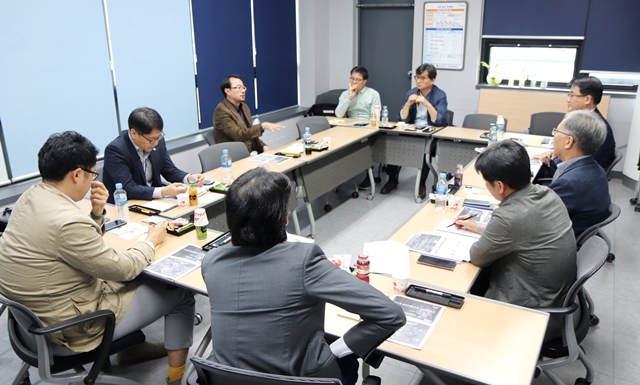Experts gathered from the government, industry, academia and research fields concerning biotech.Daejeon is strong at “basic research” but weak in “collaboration with hospitals.
Daejeon has strong points such as robust research foundations. As the saying goes, "beads only become a treasure when they are threaded together." Growing voices are saying that now is time to create a decent, full-fledged cluster equipped with infrastructure that can attract the next-generation biotech start-ups. To find an answer to what Daejeon needs for its biotech cluster, Daedeok Net held a symposium on October 23rd to consult bio-related experts in the fields of academia, industry, research and government.
Experts in a united voice expressed the desperate need for a control tower and start-up spaces in addition to Daejeon's resources, meaning that a start-up incubation complex should be built nearby KAIST and Korea Research Institute of Bioscience and Biotechnology (KRIBB) to support start-ups and enable exchanges between them. Some suggested that there should be a policy put in place to help professors and researchers re-start after failing so that they can start up their business without fear. They also emphasized that success stories of biotech start-ups in Daejeon should turn into a brand, making Daejeon into a household name for "biotech."
Joining the symposium were Kim Jeongseok, Head of Division of Planning and Management of KRIBB (hereinafter "Div. Head Kim"); Moon Changyong, Director General of Daejeon Metropolitan City ("Director-General Moon"); Seo Kyeonghun, CEO of E&S Healthcare ("CEO Seo"); Lee Seongun, CEO of RevoSketch ("CEO Lee"); Lee Seungwoo, Director of Blue Point Partners ("Director Lee"); Jeon Sangyong, professor of Life Science Department of KAIST ("Prof. Jeon") and Cho Gunho, Chairman of Bio Convergence Center of Daejeon Techno Park ("Chairman Cho").


Q. Daejeon is strong at bio-discovery, but requires "space."
- Director Lee: Daejeon is a unique city incomparable to Seoul and Gyeonggi Province. Its strong points are that the city is equipped with the infrastructure needed for the establishment of start-ups and has a lot of human resources to engage in research-related discourses; its weakest link is hospitals. Even investment firms jokingly said that hospitals other than Seoul Severance Hospital and Asan Medical Center seem to fall short of capacities when Korean start-ups perform a clinical trial. I'd like to see hospitals in Daejeon reinvent themselves to play an active role as biotech start-ups do. With collaboration with hospitals, I also believe that Daejeon can indeed become a cradle for start-ups in their early stage.
- CEO Lee: A start-up with less operating costs is in a more advantageous position for advancing into an overseas market, which is a reason I chose Daejeon as a start-up location four times. However, what is less desirable about the city is the demand and supply of human resources. Nevertheless, Daejeon has KAIST and KRIBB, which are its largest pillars of resources. I believe that with the creation of a large-scale business complex between the two buildings and with investments made in tenant companies, an ecosystem would be created where convergence is a norm. It would help to form the connections and ties among clusters and also find differentiation from each other.
- Prof. Jeon: When I started up my own business, there wasn't much space for R&D during its early stages. We desperately need space that could house a variety of healthcare firms and help them engage in exchanges with KAIST and KRIBB. They should be located nearby to interact with each other vigorously and share communal equipment. If such a complex is built to support start-ups in their early stage, professors and researchers would actively pursue their own business and investors will pay attention.
- Div. Head Kim: Daejeon cannot be equipped with everything. The best course of action would be to progress step-by-step starting from the city's strong points. Daejeon is good at discovery among the three realms of biotech, including discovery, development and production. Cooperation is needed in each stage. It is also important in helping start-ups advance into the global market. In Boston, United States, for instance, there are more than 20 start-ups established by Israeli entrepreneurs. South Korea is not the only market available out there.
Q. A lesson to be learned from the Boston Biotech Cluster is its research culture of cooperation.
- Div. Head Kim: I have put together success factors of Boston's biotech cluster. First of all, what makes Boston so special is a research culture of cooperation befitting the needs of corporations rather than the very existence of the world's sought-after universities. As a result, brilliant technologies are handed over to corporations. Yet another success factor is the best and brightest coming from all over the world, along with research-oriented hospitals. It has 28,000 R&D researchers and 100,000 employees working in industrial circles. On top of that, large-sized global bio-pharmaceutical firms cooperate with more than 1,000 start-ups. Also, abundant funds and the State government's supportive policy play a role. I was told that there were over 100 discussions to establish the biotech cluster in Boston. I think what we see in Daejeon is quite similar to Boston a decade ago. Thus, the areas on which we should focus include translational research, entrepreneur culture, capacity-building, infrastructure and ecosystems.
- General Director Moon: Daejeon is quite similar to Boston. I don't think only entrepreneurs who used to be students or professors in Daejeon will fill it. Talented people around the globe have flocked to Boston. If we inform those in the industry that intensive supports are provided to start-ups in their early stage and prepare space for them, entrepreneurs from other metropolitan areas will come to Daejeon to initiate their business.
- CEO Seo: Both companies and the city of Daejeon respectively have some obstacles to overcome; however, it seems that they have not entirely played their roles. Even with a baby step, efforts should be made to surpass such obstacles. Also, an environment should be created to encourage outstanding human resources from KAIST, universities and hospitals to become entrepreneurs and start their own business. Daejeon has resources on which researchers and universities can rely. However, there are still many regulations that stand in the way of becoming an entrepreneur. A professor can only double as an entrepreneur for five years, and the professor appraisal system does not do any good for business start-ups. It is no wonder that professors are afraid of starting up their business and often hesitate before stepping toward its establishment. To encourage them to begin a business, we need a policy that gets the city or the government to remove these burdens, i.e., a policy that helps them to re-start even after failure and stands firmly by their side.
Q. Daejeon must become a household name for "Biotech" ... Need to turn Daejeon into a brand based on its success stories
- CEO Seo: Why hasn't Daejeon attracted venture capitalists and large-sized foreign pharmaceutical firms? It is because currently, firms in Daejeon have attained success on their own. Although those firms are located in Daejeon, the city itself has failed to garner attention. Thus, we need a strategy in which firms meet with large conglomerates, pharmaceutical firms and investors using Daejeon as a brand so that light can be shed on both the firms and Daejeon. For instance, spreading success stories such as LegoChem Bioscience's technological transfer can be one approach.
- Director Lee: Daejeon can take pride in the fact that it is the only one that has survived this barren environment. Rather than becoming just another Boston, I think it's best to create Daejeon's own brand by publicizing Daejeon's success stories. If materials developed by LegoChem Bioscience turn into a new medicine, the following question would be made "What has made such success possible in Daejeon?" with references to the city. It takes more than one or two years to garner attention from the world. Daejeon indeed has a big pool of outstanding researchers, corporations and investors. Let's make the most of its resources.
- Prof. Jeon: Lego Chem Bioscience's outcome is the product of previous successes. However, the current issue with Daejeon is the lack of next-generation start-ups that will take the lead in the biotech sector. In five years, the number of these firms will dramatically decrease. We need to create a system and ecosystem that maintains the zeal for biotech and nurtures new start-ups, bolstered by public relations efforts. Daejeon has already an environment conducive to creating a biotech hub.
- Div. Head Kim: We also need to be equipped with fundamentals such as materials written in English that describe the current status of the biotech sector in Daejeon. Currently, there are no materials that can introduce Daejeon to overseas markets. On top of that, it is also a good idea to regularly throw a bio-related festival in Daejeon, offering opportunities to visit start-ups. This will help create a brand.
- Chairman Cho: At the mention of "Bio," people indeed think of Osong, Daegu, Songdo and Wonju. Compared to these areas, Daejeon's biotech industry is not yet well-known.

댓글 정렬